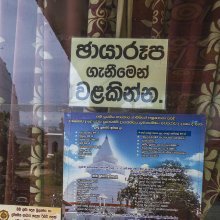Savasa, Śavāśa, Śavasa, Savasha, Shava-asha, Shavasa, Shavasha: 12 definitions
Introduction:
Savasa means something in Hinduism, Sanskrit, Buddhism, Pali, Marathi, Hindi. If you want to know the exact meaning, history, etymology or English translation of this term then check out the descriptions on this page. Add your comment or reference to a book if you want to contribute to this summary article.
The Sanskrit terms Śavāśa and Śavasa can be transliterated into English as Savasa or Shavasha or Shavasa, using the IAST transliteration scheme (?).
Images (photo gallery)
In Hinduism
Purana and Itihasa (epic history)
Source: JatLand: List of Mahabharata people and placesŚavasa (शवस) is a name mentioned in the Mahābhārata (cf. I.60.18) and represents one of the many proper names used for people and places. Note: The Mahābhārata (mentioning Śavasa) is a Sanskrit epic poem consisting of 100,000 ślokas (metrical verses) and is over 2000 years old.

The Purana (पुराण, purāṇas) refers to Sanskrit literature preserving ancient India’s vast cultural history, including historical legends, religious ceremonies, various arts and sciences. The eighteen mahapuranas total over 400,000 shlokas (metrical couplets) and date to at least several centuries BCE.
Languages of India and abroad
Pali-English dictionary
Source: Sutta: The Pali Text Society's Pali-English DictionarySavasa, (sa4+vasa) one’s own will DhsA. 61 (°vattitā; cp. Expos. 81). (Page 700)

Pali is the language of the Tipiṭaka, which is the sacred canon of Theravāda Buddhism and contains much of the Buddha’s speech. Closeley related to Sanskrit, both languages are used interchangeably between religions.
Marathi-English dictionary
Source: DDSA: The Molesworth Marathi and English Dictionarysavāśā (सवाशा).—m (śavāśēṃ) A tribe of Brahmans or an individual of it. Originating in a company of one hundred and twenty five Brahmans defiled by partaking of a Shraddha-entertainment given by a Brahman, himself defiled by carnal connection with a mahārīṇa.
Source: DDSA: The Aryabhusan school dictionary, Marathi-Englishsavāśā (सवाशा).—m A tribe of Brahmans or an in- dividual of it.
Marathi is an Indo-European language having over 70 million native speakers people in (predominantly) Maharashtra India. Marathi, like many other Indo-Aryan languages, evolved from early forms of Prakrit, which itself is a subset of Sanskrit, one of the most ancient languages of the world.
Sanskrit dictionary
Source: DDSA: The practical Sanskrit-English dictionaryŚavāśa (शवाश).—a. feeding on corpses; यावन् नराशैर्न रिपुः शवाशान् संतर्पयत्यानम तावदस्मै (yāvan narāśairna ripuḥ śavāśān saṃtarpayatyānama tāvadasmai) Bhaṭṭikāvya 12. 75.
Śavāśa is a Sanskrit compound consisting of the terms śava and āśa (आश).
Source: Cologne Digital Sanskrit Dictionaries: Shabda-Sagara Sanskrit-English DictionarySavāsa (सवास).—mfn.
(-saḥ-sā-saṃ) 1. Scented, perfumed. 2. Having a dwelling. E. sa with, vāsa abode, &c.
Source: Cologne Digital Sanskrit Dictionaries: Benfey Sanskrit-English DictionarySavāsa (सवास).—adj. 1. having a dwelling. 2. scented.
Savāsa is a Sanskrit compound consisting of the terms sa and vāsa (वास).
Source: Cologne Digital Sanskrit Dictionaries: Monier-Williams Sanskrit-English Dictionary1) Śavāśa (शवाश):—[from śava] m. a c°-eater, [Bhaṭṭi-kāvya]
2) Śavasā (शवसा):—[from śavas > śava] ind., mightily, with might
3) Savāsa (सवास):—[=sa-vāsa] [from sa > sa-vaṃśā] 1. sa-vāsa mfn. scented, perfumed, [Jātakamālā]
4) [v.s. ...] 2. sa-vāsa mfn. having a dwelling, [ib.]
5) Sāvasa (सावस):—mfn. supplied with provisions, [Śatapatha-brāhmaṇa]
Source: Cologne Digital Sanskrit Dictionaries: Yates Sanskrit-English DictionarySavāsa (सवास):—[sa-vāsa] (saḥ-sā-saṃ) a. Having a house; perfumed.
[Sanskrit to German]
Sanskrit, also spelled संस्कृतम् (saṃskṛtam), is an ancient language of India commonly seen as the grandmother of the Indo-European language family (even English!). Closely allied with Prakrit and Pali, Sanskrit is more exhaustive in both grammar and terms and has the most extensive collection of literature in the world, greatly surpassing its sister-languages Greek and Latin.
Hindi dictionary
Source: DDSA: A practical Hindi-English dictionarySavāsa (सवास):—(a) aromatic, perfumed; having a dwelling (place).
...
Kannada-English dictionary
Source: Alar: Kannada-English corpusSāvāsa (ಸಾವಾಸ):—
1) [noun] the fact of living together; co-dwelling or co-habitation.
2) [noun] the fact of being associated with another; association.
3) [noun] sexual union.
Kannada is a Dravidian language (as opposed to the Indo-European language family) mainly spoken in the southwestern region of India.
See also (Relevant definitions)
Partial matches: Shava, Asha, Aashaa, Vasa, Vaca, Ca, Sha, Aca.
Starts with (+1): Cava-cavaenal, Cavacam, Cavacanam, Savasaka, Savasal, Savasanjaca, Savasari, Savasas, Savasavakara, Shavasadhana, Shavasamputa, Shavasamskara, Shavasana, Shavasanarasa, Shavasaushinareshu, Shavasavant, Shavasavat, Shavashatamaya, Shavashauca, Shavashaya.
Query error!
Full-text: Savasas, Shavasavat, Nakshatrashavas, Cavacam, Indratvota, Tras, Sunu, Utsava, Putra, Vriddha.
Relevant text
Search found 14 books and stories containing Savasa, Sa-vasa, Sa-vāsa, Śava-āśa, Sava-asa, Savāśā, Śavāśa, Śavasa, Savāsa, Śavasā, Sāvasa, Sāvāsa, Savasha, Shava-asha, Shavasa, Shavasha; (plurals include: Savasas, vasas, vāsas, āśas, asas, Savāśās, Śavāśas, Śavasas, Savāsas, Śavasās, Sāvasas, Sāvāsas, Savashas, ashas, Shavasas, Shavashas). You can also click to the full overview containing English textual excerpts. Below are direct links for the most relevant articles:
Rig Veda (translation and commentary) (by H. H. Wilson)
World Journal of Pharmaceutical Research
Study on pranavaha srotas w.s.r. to tamak swas < [2018: Volume 7, May issue 9]
Shvasahara mahakashaya and its pharmacology < [2015: Volume 4, October issue 10]
Diet and lifestyle changes for Tamaka Shwasah and asthma. < [2015: Volume 4, April issue 4]
Atharvaveda and Charaka Samhita (by Laxmi Maji)
Treatment of Pāṇḍuroga (Hariman) < [Chapter 3 - Diseases and Remedial measures (described in Atharvaveda)]
Lord Hayagriva in Sanskrit Literature (by Anindita Adhikari)
Saṃhitā (1): Divine steed in the Ṛgveda < [Chapter 2]
Effect of svasa kuthararasa and sirishadi kashaya on patients of tamaka svasa < [Volume 15 (issue 3), Jan-Mar 1996]
Mudrarakshasa (literary study) (by Antara Chakravarty)
2. The theory of rīti < [Chapter 5 - Adoption of Style and Language in Mudrārākṣasa]

